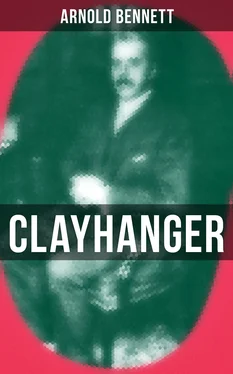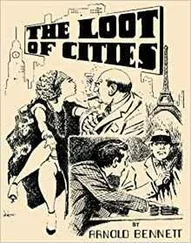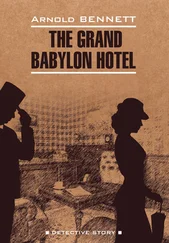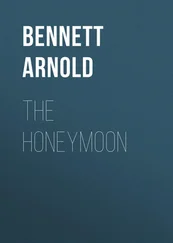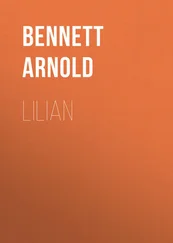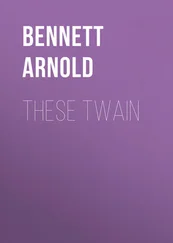The winning boat, long preceded by its horse, crawled under the bridge and passed northwards to the sea, laden with crates of earthenware. And then the loser, with the little girl’s father and mother and her brothers and sisters, and her kitchen, drawing-room, and bedroom, and her smoking chimney and her memories and all that was hers, in the stern of it, slid beneath the boys’ down-turned faces while the whip cracked away beyond the bridge. They could see, between the whitened tarpaulins, that the deep belly of the craft was filled with clay.
“Where does that there clay come from?” asked Edwin. For not merely was he honestly struck by a sudden new curiosity, but it was meet for him to behave like a man now, and to ask manly questions.
“Runcorn,” said the Sunday scornfully. “Can’t you see it painted all over the boat?”
“Why do they bring clay all the way from Runcorn?”
“They don’t bring it from Runcorn. They bring it from Cornwall. It comes round by sea—see?” He laughed.
“Who told you?” Edwin roughly demanded.
“Anybody knows that!” said the Sunday grandly, but always maintaining his gay smile.
“Seems devilish funny to me,” Edwin murmured, after reflection, “that they should bring clay all that roundabout way just to make crocks of it here. Why should they choose just this place to make crocks in? I always understood—”
“Oh! Come on!” the Sunday cut him short. “It’s blessed well one o’clock and after!”
They climbed the long bank from the canal up to the Manor Farm, at which high point their roads diverged, one path leading direct to Bleakridge where Orgreave lived, and the other zigzagging down through neglected pasturage into Bursley proper. Usually they parted here without a word, taking pride in such Spartan taciturnity, and they would doubtless have done the same this morning also, though it were fifty-fold their last walk together as two schoolboys. But an incident intervened.
“Hold on!” cried the Sunday.
To the south of them, a mile and a half off, in the wreathing mist of the Cauldon Bar Ironworks, there was a yellow gleam that even the capricious sunlight could not kill, and then two rivers of fire sprang from the gleam and ran in a thousand delicate and lovely hues down the side of a mountain of refuse. They were emptying a few tons of molten slag at the Cauldon Bar Ironworks. The two rivers hung slowly dying in the mists of smoke. They reddened and faded, and you thought they had vanished, and you could see them yet, and then they escaped the baffled eye, unless a cloud aided them for a moment against the sun; and their ephemeral but enchanting beauty had expired for ever.
“Now!” said Edwin sharply.
“One minute ten seconds,” said the Sunday, who had snatched out his watch, an inestimable contrivance with a centre-seconds hand. “By Jove! That was a good ’un.”
A moment later two smaller boys, both laden with satchels, appeared over the brow from the canal.
“Let’s wait a jiff,” said the Sunday to Edwin, and as the smaller boys showed no hurry he bawled out to them across the intervening cinder-waste: “Run!” They ran. They were his younger brothers, Johnnie and Jimmie. “Take this and hook it!” he commanded, passing the strap of his satchel over his head as they came up. In fatalistic silence they obeyed the smiling tyrant.
“What are you going to do?” Edwin asked.
“I’m coming down your way a bit.”
“But I thought you said you were peckish.”
“I shall eat three slices of beef instead of my usual brace,” said the Sunday carelessly.
Edwin was touched. And the Sunday was touched, because he knew he had touched Edwin. After all, this was a solemn occasion. But neither would overtly admit that its solemnity had affected him. Hence, first one and then the other began to skim stones with vicious force over the surface of the largest of the three ponds that gave interest to the Manor Farm. When they had thus proved to themselves that the day differed in no manner from any other breaking-up day, they went forward.
On their left were two pitheads whose double wheels revolved rapidly in smooth silence, and the puffing engine-house and all the trucks and gear of a large ironstone mine. On their right was the astonishing farm, with barns and ricks and cornfields complete, seemingly quite unaware of its forlorn oddness in that foul arena of manufacture. In front, on a little hill in the vast valley, was spread out the Indian-red architecture of Bursley—tall chimneys and rounded ovens, schools, the new scarlet market, the grey tower of the old church, the high spire of the evangelical church, the low spire of the church of genuflexions, and the crimson chapels, and rows of little red houses with amber chimney-pots, and the gold angel of the blackened Town Hall topping the whole. The sedate reddish browns and reds of the composition, all netted in flowing scarves of smoke, harmonised exquisitely with the chill blues of the chequered sky. Beauty was achieved, and none saw it.
The boys descended without a word through the brick-strewn pastures, where a horse or two cropped the short grass. At the railway bridge, which carried a branch mineral line over the path, they exchanged a brief volley of words with the working-lads who always played pitch-and-toss there in the dinner-hour; and the Sunday added to the collection of shawds and stones lodged on the under ledges of the low iron girders. A strange boy, he had sworn to put ten thousand stones on those ledges before he died, or perish in the attempt. Hence Edwin sometimes called him “Old Perish-inthe-attempt.” A little farther on the open gates of a manufactory disclosed six men playing the noble game of rinkers on a smooth patch of ground near the weighing machine. These six men were Messieurs Ford, Carter, and Udall, the three partners owning the works, and three of their employees. They were celebrated marble-players, and the boys stayed to watch them as, bending with one knee almost touching the earth, they shot the rinkers from their stubby thumbs with a canon-like force and precision that no boy could ever hope to equal. “By gum!” mumbled Edwin involuntarily, when an impossible shot was accomplished; and the bearded shooter, pleased by this tribute from youth, twisted his white apron into a still narrower ring round his waist. Yet Edwin was not thinking about the game. He was thinking about a battle that lay before him, and how he would be weakened in the fight by the fact that in the last school examination, Charlie Orgreave, younger than himself by a year, had ousted him from the second place in the school. The report in his pocket said: “Position in class next term: third;” whereas he had been second since the beginning of the year. There would of course be no “next term” for him, but the report remained. A youth who has come to grips with that powerful enemy, his father, cannot afford to be handicapped by even such a trifle as a report entirely irrelevant to the struggle.
Suddenly Charlie Orgreave gave a curt nod, and departed, in nonchalant good-humour, doubtless considering that to accompany his chum any farther would be to be guilty of girlish sentimentality. And Edwin nodded with equal curtness and made off slowly into the maze of Bursley. The thought in his heart was: “I’m on my own, now. I’ve got to face it now, by myself.” And he felt that not merely his father, but the leagued universe, was against him.
Table of Contents
The various agencies which society has placed at the disposal of a parent had been at work on Edwin in one way or another for at least a decade, in order to equip him for just this very day when he should step into the world. The moment must therefore be regarded as dramatic, the first crucial moment of an experiment long and elaborately prepared. Knowledge was admittedly the armour and the weapon of one about to try conclusions with the world, and many people for many years had been engaged in providing Edwin with knowledge. He had received, in fact, “a good education”—or even, as some said, “a thoroughly sound education;” assuredly as complete an equipment of knowledge as could be obtained in the county, for the curriculum of the Oldcastle High School was less in accord with common sense than that of the Middle School.
Читать дальше
